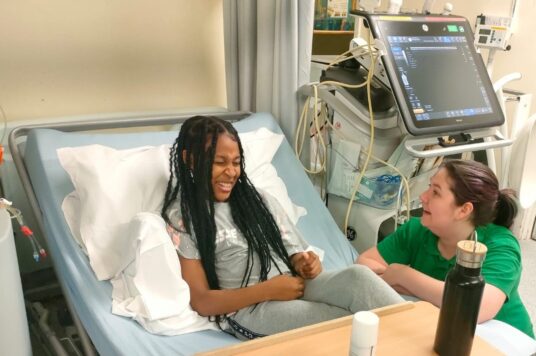Ultrasound transforms life of teenager with genetic health condition
A teenager with a genetic health condition is able to play sport and enjoy a pain-free holiday thanks to a pioneering procedure.
Neriya-May Hall is one of the sickle cell disease patients at St George’s Hospital in Tooting, South West London, to have their lives transformed by the use of ultrasound to administer blood transfusions.
People with sickle cell disease produce unusually-shaped red blood cells, and about 160 patients at St George’s receive a special type of blood transfusion that replaces those cells with donor blood.
Neriya, who is 13 and from Croydon, needs this “gold-standard” treatment every four to five weeks and has been receiving care at St George’s for about five years.
Thanks to the use of ultrasound – which guides the needles for the transfusion into her veins – the time the procedure takes is halved and Neriya is able to go home just hours later and return to school the next day.
Neriya can also play sports and enjoy days out safe in the knowledge she is much less likely to experience a sickle cell crisis – which are episodes of pain that happen when blood vessels become blocked.

Blood tests predict how often someone needs the procedure, meaning Neriya can also plan holidays and trips away. Just a few weeks ago, Neriya and her family were able to go to Morocco – something that wouldn’t have been possible before.
Dad Leon says: “Before this, we had to fly back from holiday because Neriya had a crisis and she was in so much pain, which was horrible to see. But all of that has gone away now. We feel confident when she has this treatment that we can go away.
“We’ve noticed such a difference, and it’s much better for Neriya. She’s amazing, and just takes it all in her stride.”
Ultrasound is used to guide needles into a patient’s vein for the transfusion instead of fitting a permanent port. This way, as well as providing more comfort to the patient, it’s more likely a suitable vein will be found the first time.
Before the procedure, Neriya has her height and weight checked, before playing a word game with one of St George’s play specialists.
Speaking from one of the hospital’s children’s wards during the treatment, Neriya said: “They help me to stay well, and not get sick. Everyone is so nice and supportive, and we know a lot of people here now.”
In-between, she explains how she has even spoken to other children who are about to start the same treatment to reassure them it will be OK.
“I said it’s better,” says Neriya. “It might hurt for five minutes, but then it’s calm. It’s better this way, because you get it done, and you know you’re good for another five weeks.”
Sickle cell disease is a serious and lifelong condition that is particularly common in people with an African or Caribbean family background.
It’s caused by a gene that affects how red blood cells develop – and if both parents have the gene, there’s a one in four chance of each child they have being born with sickle cell.
Kate Slemeck, Managing Director for St George’s University Hospitals NHS Foundation Trust, said: “Our specialist centre cares for 700 children and adults with sickle cell every year – using advanced treatments to help them live well. Neriya’s story demonstrates how such advancements are making a difference to quality of life and experience.
“We couldn’t do it without the support of all the amazing blood donors out there. Every month we use 1,000 packs of red cells to deliver this treatment, and we need people, particularly of Black heritage, to give blood, as donors of the same ethnicity are most likely to provide the best match for patients with sickle cell.”
Michaela Mayhew, a haematology nurse at St George’s, said: “Using ultrasound in this way is rare, and seeing patients like Neriya live their lives as a result makes me very proud.
“Things have changed a lot, in terms of how we treat people with sickle cell disease, and the younger generation – like Neriya – show what can be done.”
NHS Blood and Transplant needs 12,000 extra donors of Black heritage, and 250 donations, every day, to help meet the demand for patients with sickle cell. To find out more, visit: www.blood.co.uk


